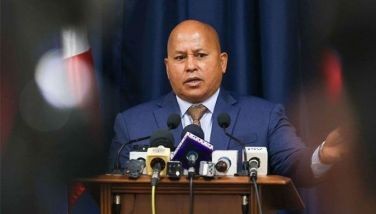UST shifting to July-May school calendar
MANILA, Philippines - The University of Santo Tomas (UST) has moved its college opening to July beginning school year 2014-2015, according to The Varsitarian, the school’s official student publication.
The university’s office of the secretary-general has released the new academic calendar, moving classes to July-May from the traditional June-March schedule.
Last week, the University of the Philippines System, except the UP Diliman campus, and Ateneo de Manila University announced the shift in its academic calendar from June-March to August-May.
The change in the academic calendar is supposed to be in preparation for the integration of the Association of Southeast Asian Nations in 2015.
The Mass of the Holy Spirit or the traditional Misa de Apertura, which marks the opening of the academic year in UST, is scheduled on July 7, The Varsitarian said.
The start of regular classes will be on July 14, while the annual Thomasian Welcome Walk for incoming freshmen is scheduled on July 11.
For the first semester, the preliminary examinations will be in September while the finals will be in November, instead of August and October, respectively. The first semester will end in November after the last week of final examinations, which is slated on Nov. 17.
The semestral break will last up to Jan. 4, 2015.
The UST’s traditional Paskuhan, which will fall during the semestral break, will be held on Dec. 8, the Feast of the Immaculate Conception.
The second semester will start on Jan. 5, 2015.
For non-graduating students, the preliminary examinations will be on March 6, while the finals will take place on May 15.
In the old calendar, the exams were held in January and March, respectively.
For graduating students, the final exams will begin on April 20.
The baccalaureate mass is scheduled on May 15, while the solemn investiture activities will start on May 26.
Classes will be interrupted by Holy Thursday (April 2), Good Friday (April 3), Araw ng Kagitingan (April 9) and Labor Day (May 1).
A third term that will take the place of summer classes will start on June 3. The preliminaries for this short term will begin on June 17, while the finals will be on July 7.
DepEd urged to adopt calendar shift proposals
As this developed, the head of the Federation of Associations of Private School and Administrators (FAPSA) urged yesterday the Department of Education (DepEd) to adopt proposals to move the class opening to August for elementary and high schools.
“So if our colleges and universities opened in August, the basic education also has to be synchronized as we are the only feeders of these tertiary institutions… Since big colleges have decided, basic education has to make the necessary adjustment,†FAPSA president Eleazardo Kasilag said in a statement.
He noted that the proposal should be revisited by DepEd and select schools in the National Capital Region (NCR) that would pilot the August school opening.
“If this is not possible in the entire country, then we can pilot it in NCR. To say DepEd shall have difficulty to coordinate with school records, then let the regional offices take care of that,†he added.
But Education Secretary Armin Luistro had said there is no compelling reason to change the academic calendar for elementary and high schools.
Luistro explained that unlike in tertiary education, there is no common school opening among ASEAN countries. Schools in Brunei Darussalam open in January, Cambodia in October, Indonesia in July, Laos in September, Vietnam in August, Thailand in May, and Myanmar and the Philippines in June.
Elections affected
The Commission on Elections (Comelec) also cautioned that the change in school opening might have an impact on the conduct of elections.
Comelec spokesman James Jimenez posted in his Twitter account @jabjimenez that there might be a problem if the academic calendar changes would cover public schools.
He noted that elections are always held in schools on the second Monday of May while students are still on summer break, and public school teachers serve as members of the Board of Election Inspectors that conducts the voting and counting of votes.
“It’s just a gentle reminder that there are many factors that must be considered first,†Jimenez said.
Calendar shift repealed in 1960s
In the early 1960s, the DepEd implemented a gradual shift in the opening of classes but it was repealed a year later following the uproar from the private sector and parents who were not consulted on the matter.
UP Department of History chairman Maria Bernadette Abrera said at a forum on the Philippine academic calendar at UP last Monday that the DepEd in 1963 came up with a proposal to start classes in September.
Abrera said the shift during the administration of President Diosdado Macapagal – called the “Roces Plan†after then Education Secretary Alejandro Roces – was supposed to be implemented over a three-year period, with classes opening in July in 1963, August in 1964 and September in 1965.
According to the Roces Plan, the benefits of the shift include having a healthy student population as children would no longer have to go to school during the beginning of the rainy season and an economically productive country as children would be able to help during the planting season from June to August.
But Abrera said then Sen. Maria Kalaw-Katigbak filed a measure in 1964 that effectively repealed the Roces Plan. It stated that the school opening should be anytime between June 1 to July 31.
“The Katigbak law did not state the reason for reverting it, but support for the law came from the parents,†Abrera said, noting that parents wrote letters to editors and claimed that they were not consulted in the shift.
“They did not want to send their children to school during hot months… It turns out that during that time in the ‘60s in the summer, even government employees were given half days because of the heat,†she noted. – With Janvic Mateo, Sheila Crisostomo
- Latest
- Trending































